- Home
- C. Sean McGee
The Time Traveler's Wife Page 4
The Time Traveler's Wife Read online
Page 4
efficacious and meek, to see if she was wetted to their staunch masculine physique.
She stood beside John humming a song that he hadn’t heard in such a long time. He couldn’t remember which the song was; only that he had loved it once, just as this girl probably did now. The girl smiled at John, but he didn’t notice. He was travelling through his thoughts, trying to find the name of that song.
On the way to the car, Stefan was talking about his children’s performances at school and how being a father was so clichéd but that the thing about clichés was, they were true, that’s why they were clichés. Not because they were uneducated guesses at thoughts and feelings and at social condition, but because they were ubiquitous and common and absolutely sure and right, and that’s what made clichés, clichés.
Stefan was happy about this.
John on the other hand…
Stefan continued talking about his life and then about which girls in the office he would love to fuck and the carnal and depraved acts they would no doubt beg of him to inflict upon them. And he swung his words and swagger like a nymph would, their veiny and stiffened erection, thrusting his hips back and forth and flicking his tongue between the extended V of his fingers. John wondered if Stefan had even seen his penis in the last ten years. So much fat and matted pubic hair hanged over that he was sure Stefan must piss in the shower, so as not to make a mess.
“It’s all about the V,” Stefan said.
“Why didn’t your parents call you Steven?” John asked. “Was it like a Pseudo-European thing?”
As he responded, John saw that girl again, and as Stefan spoke, walking towards John’s car, John verged off in the direction of the girl, baited, not by a sexing desire, but by a hint of the past, a time that he had wished away when he was living it and now – now that time was like a pail of bricks that he carried on his shoulders, the past was somewhere where he longed to return.
“Hey John” Stefan shouted, standing by John’s car and shrugging his shoulders excessively as if he didn’t understand the situation. “I don’t understand,” he said, confirming.
John ignored his friend and his colleague, someone he had, like a meaningless popular expression, learned to understand and even appreciate over the years but as of late, someone that he despised and someone who he daydreamed about in an explicit and violent manner.
“You’re going the wrong way” Stefan shouted. “The car is here.”
What the fuck was she humming? He knew what it was. It was right there on the tip of his tongue. But what was it? What the fuck was it? And how far back had she taken him?
“I’ll see you tonight then.”
He ignored Stefan and followed the girl through the car park and onto the sidewalk and then down along the avenue until they reached the bus stop. There he stood just behind her and he listened to her humming, closing his eyes and letting his mind wander, trying not to determine what the song was but instead, to let his subconscious decide for him, just as it had every other moment of his life, decided upon innocuous little things like what cold tasted like on the tip of his tongue, the edges of his teeth and on the roof of his mouth. And on whether he should piss straight into the bowl with arrogant disregard for how his guests feel or whether he should gyrate in quiet and careful circles and run the risk of missing the bowl entirely and pissing on the floor. And so, listening to the girl hum, he let his subconscious decide for him just as he had let it decide upon following her in the first place.
The bus came and he got on, following the girl but with a person or two between them, so she wouldn’t become suspicious and stop her humming. When he paid the fare to the driver he turned in the direction of the seats but the girl was gone. He tried looking left and right, but he couldn’t see her anywhere. It was as if she never got on.
Then who was he following?
“Hurry up mister” spoke a person behind, pushing against his back and urging him down the aisle.
The thought of getting off only came when it was too late, when he was already wedging himself in the aisle, pushing his way down the back of the bus. The doors closed and the bus driver honked his horn and then after a shaky start, the bus made it way on to the freeway.
John scanned the bus looking for the girl, but all he could see was the same sight. Seat after seat and row after row, he saw scores of people huddled together and sat cramped and uncomfortable next to each other, all with the same book tied of their faces, all with the covers facing out with their fingers moving over every word as they all read in thorough enjoyment, the blurb on the backs of their books. John moved down the aisle bewildered by what he saw. And it wasn’t until he got near the middle of the bus that he saw an empty seat that nobody had bothered to fill and so he sat down.
There was a young man sitting by the window reading a book with no cover. John sat beside him and at first tried to keep his attention from floating back to the man’s book, but he couldn’t resist.
“What are you reading?” he asked.
“A book,” The Man said.
“That’s obvious. What’s it called?”
The Man turned to the coverless plank front page. He shook his shoulders and went back to reading.
“Has no title?” he said.
“Every book has a title.”
“Well” The Man said, showing the blank coverless front pages to John, “It appears that this book doesn’t.”
“But what is it?”
“Well, it’s a book,” The Man said, hardly turning his attention from the words.
“I know that,” John said, staring at the front and back pages which were blank. “But what’s it called? Who wrote it? What’s it about?”
His intrigue was bordering on scathing obsession. There was no cover at all. No title and no author and no blurb. And the cover, it hadn’t been dog eared or needlessly torn, for there was not a lick of paper out of place. There was not a nick or a cut or a tiny thread out of place from the finely woven spine. It was just a book without a cover as if someone had been crazy enough to want it this way.
“I don’t know what it’s called,” The Man said. “And I’m fairly sure I’m blank as to who authored it.”
“Maybe I’ve read it before,” Stefan said, now desperate to know the title. “What’s it about?”
“I’m not quite sure,” The Man said smiling. “I suppose I’ll find out at the end.”
As the bus rode along, John tried to think of the last book he had read or the last film he had watched without having first read a blurb or a review. He couldn’t think of one. He couldn’t even think of a room he had been in at any point in his life that hadn’t already been designated for some purpose.
The Man’s eyes lit as he strolled over every word in a way that John had never seen another person read, different to the scores of people beside him who all courted the same novel, turning page after page in unison with one desperate person who just got on at the last stop asking, “For god’s sake, does anyone know if he catches the whale?”
“What do you do?” John asked, watching how The Man mouthed the words “Oh, my!” and “Well, I never.” Not as if he were doggedly following the dialogue, but as if each paragraph were a stone that hinged him further to genuine intrigue and surprise.
“I am a philosopher,” The Man said.
“Where did you study?” John asked, intrigued, like a man with a swollen cyst having so luckily stumbled upon a wandering physician.
“I didn’t.”
John looked frazzled.
“But how can you be a philosopher if you didn’t study?”
“Does a drunk have to attend a meeting to know that he has a problem?”
“Alright then. What’s the meaning of life?”
“Would it really make a difference if it told you?” The Man said.
He had a look on his face as if he knew. John could tell.
“I need to know.”
“You know enough already. Do you really need to know one more innocuou
s thing?”
“It’s not nothing. It’s life. Why are we alive?
“What will it change if you understand now before you’ve finished your own story? And what then if you didn’t like the ending, would you put the book down? Would you ever pick another one up?”
“Maybe.”
“But you could never understand the ending without having read the entire story and even then, it might be you who is out of context.”
“Just tell me, why do we do the same thing every god damned day?”
“Existence is an equation; a series of patterns, it is one singularity, divided into an infinite number of wholes which too are further divided into infinitesimal complexity and chaotic function. There is no difference or inequality. A light can be no more on than on, and it can be no more off than off.”
“What does that mean?”
“Everything is one,” The Man said.
“What about people? People are different.”
“A one of any color is still a one.”
“Can I change my future? Can I change the result?”
“Why not just change your expectation? It seems more pragmatic.”
“I wish I didn’t know how everything was going to be. I wish there was one thing that I didn’t know, that I couldn’t see coming. Like when I was younger and everything made sense. If this is it if this is life if I know every outcome, then why shouldn’t I just kill myself now? Why isn’t that the grand philosophical dilemma? If my purpose is to fulfill every expectation and if there are no more surprises, then am I omniscient? Is this how God is with
She stood beside John humming a song that he hadn’t heard in such a long time. He couldn’t remember which the song was; only that he had loved it once, just as this girl probably did now. The girl smiled at John, but he didn’t notice. He was travelling through his thoughts, trying to find the name of that song.
On the way to the car, Stefan was talking about his children’s performances at school and how being a father was so clichéd but that the thing about clichés was, they were true, that’s why they were clichés. Not because they were uneducated guesses at thoughts and feelings and at social condition, but because they were ubiquitous and common and absolutely sure and right, and that’s what made clichés, clichés.
Stefan was happy about this.
John on the other hand…
Stefan continued talking about his life and then about which girls in the office he would love to fuck and the carnal and depraved acts they would no doubt beg of him to inflict upon them. And he swung his words and swagger like a nymph would, their veiny and stiffened erection, thrusting his hips back and forth and flicking his tongue between the extended V of his fingers. John wondered if Stefan had even seen his penis in the last ten years. So much fat and matted pubic hair hanged over that he was sure Stefan must piss in the shower, so as not to make a mess.
“It’s all about the V,” Stefan said.
“Why didn’t your parents call you Steven?” John asked. “Was it like a Pseudo-European thing?”
As he responded, John saw that girl again, and as Stefan spoke, walking towards John’s car, John verged off in the direction of the girl, baited, not by a sexing desire, but by a hint of the past, a time that he had wished away when he was living it and now – now that time was like a pail of bricks that he carried on his shoulders, the past was somewhere where he longed to return.
“Hey John” Stefan shouted, standing by John’s car and shrugging his shoulders excessively as if he didn’t understand the situation. “I don’t understand,” he said, confirming.
John ignored his friend and his colleague, someone he had, like a meaningless popular expression, learned to understand and even appreciate over the years but as of late, someone that he despised and someone who he daydreamed about in an explicit and violent manner.
“You’re going the wrong way” Stefan shouted. “The car is here.”
What the fuck was she humming? He knew what it was. It was right there on the tip of his tongue. But what was it? What the fuck was it? And how far back had she taken him?
“I’ll see you tonight then.”
He ignored Stefan and followed the girl through the car park and onto the sidewalk and then down along the avenue until they reached the bus stop. There he stood just behind her and he listened to her humming, closing his eyes and letting his mind wander, trying not to determine what the song was but instead, to let his subconscious decide for him, just as it had every other moment of his life, decided upon innocuous little things like what cold tasted like on the tip of his tongue, the edges of his teeth and on the roof of his mouth. And on whether he should piss straight into the bowl with arrogant disregard for how his guests feel or whether he should gyrate in quiet and careful circles and run the risk of missing the bowl entirely and pissing on the floor. And so, listening to the girl hum, he let his subconscious decide for him just as he had let it decide upon following her in the first place.
The bus came and he got on, following the girl but with a person or two between them, so she wouldn’t become suspicious and stop her humming. When he paid the fare to the driver he turned in the direction of the seats but the girl was gone. He tried looking left and right, but he couldn’t see her anywhere. It was as if she never got on.
Then who was he following?
“Hurry up mister” spoke a person behind, pushing against his back and urging him down the aisle.
The thought of getting off only came when it was too late, when he was already wedging himself in the aisle, pushing his way down the back of the bus. The doors closed and the bus driver honked his horn and then after a shaky start, the bus made it way on to the freeway.
John scanned the bus looking for the girl, but all he could see was the same sight. Seat after seat and row after row, he saw scores of people huddled together and sat cramped and uncomfortable next to each other, all with the same book tied of their faces, all with the covers facing out with their fingers moving over every word as they all read in thorough enjoyment, the blurb on the backs of their books. John moved down the aisle bewildered by what he saw. And it wasn’t until he got near the middle of the bus that he saw an empty seat that nobody had bothered to fill and so he sat down.
There was a young man sitting by the window reading a book with no cover. John sat beside him and at first tried to keep his attention from floating back to the man’s book, but he couldn’t resist.
“What are you reading?” he asked.
“A book,” The Man said.
“That’s obvious. What’s it called?”
The Man turned to the coverless plank front page. He shook his shoulders and went back to reading.
“Has no title?” he said.
“Every book has a title.”
“Well” The Man said, showing the blank coverless front pages to John, “It appears that this book doesn’t.”
“But what is it?”
“Well, it’s a book,” The Man said, hardly turning his attention from the words.
“I know that,” John said, staring at the front and back pages which were blank. “But what’s it called? Who wrote it? What’s it about?”
His intrigue was bordering on scathing obsession. There was no cover at all. No title and no author and no blurb. And the cover, it hadn’t been dog eared or needlessly torn, for there was not a lick of paper out of place. There was not a nick or a cut or a tiny thread out of place from the finely woven spine. It was just a book without a cover as if someone had been crazy enough to want it this way.
“I don’t know what it’s called,” The Man said. “And I’m fairly sure I’m blank as to who authored it.”
“Maybe I’ve read it before,” Stefan said, now desperate to know the title. “What’s it about?”
“I’m not quite sure,” The Man said smiling. “I suppose I’ll find out at the end.”
As the bus rode along, John tried to think of the last book he had read or the last film he had watched without having first read a blurb or a review. He couldn’t think of one. He couldn’t even think of a room he had been in at any point in his life that hadn’t already been designated for some purpose.
The Man’s eyes lit as he strolled over every word in a way that John had never seen another person read, different to the scores of people beside him who all courted the same novel, turning page after page in unison with one desperate person who just got on at the last stop asking, “For god’s sake, does anyone know if he catches the whale?”
“What do you do?” John asked, watching how The Man mouthed the words “Oh, my!” and “Well, I never.” Not as if he were doggedly following the dialogue, but as if each paragraph were a stone that hinged him further to genuine intrigue and surprise.
“I am a philosopher,” The Man said.
“Where did you study?” John asked, intrigued, like a man with a swollen cyst having so luckily stumbled upon a wandering physician.
“I didn’t.”
John looked frazzled.
“But how can you be a philosopher if you didn’t study?”
“Does a drunk have to attend a meeting to know that he has a problem?”
“Alright then. What’s the meaning of life?”
“Would it really make a difference if it told you?” The Man said.
He had a look on his face as if he knew. John could tell.
“I need to know.”
“You know enough already. Do you really need to know one more innocuou
s thing?”
“It’s not nothing. It’s life. Why are we alive?
“What will it change if you understand now before you’ve finished your own story? And what then if you didn’t like the ending, would you put the book down? Would you ever pick another one up?”
“Maybe.”
“But you could never understand the ending without having read the entire story and even then, it might be you who is out of context.”
“Just tell me, why do we do the same thing every god damned day?”
“Existence is an equation; a series of patterns, it is one singularity, divided into an infinite number of wholes which too are further divided into infinitesimal complexity and chaotic function. There is no difference or inequality. A light can be no more on than on, and it can be no more off than off.”
“What does that mean?”
“Everything is one,” The Man said.
“What about people? People are different.”
“A one of any color is still a one.”
“Can I change my future? Can I change the result?”
“Why not just change your expectation? It seems more pragmatic.”
“I wish I didn’t know how everything was going to be. I wish there was one thing that I didn’t know, that I couldn’t see coming. Like when I was younger and everything made sense. If this is it if this is life if I know every outcome, then why shouldn’t I just kill myself now? Why isn’t that the grand philosophical dilemma? If my purpose is to fulfill every expectation and if there are no more surprises, then am I omniscient? Is this how God is with

 Coffee and Sugar
Coffee and Sugar Happy People Live Here
Happy People Live Here_preview.jpg) Alex and The Gruff (A Tale of Horror)
Alex and The Gruff (A Tale of Horror)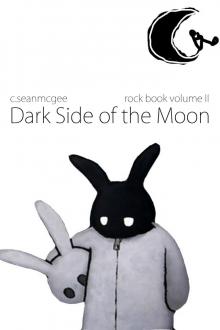 Dark Side of the Moon
Dark Side of the Moon The Terror{blist}
The Terror{blist}_preview.jpg) The Anarchist (...Or About How Everything I Own Is Covered In A Fine Red Dust)
The Anarchist (...Or About How Everything I Own Is Covered In A Fine Red Dust)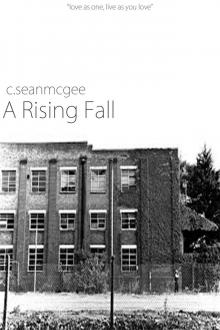 A Rising Fall
A Rising Fall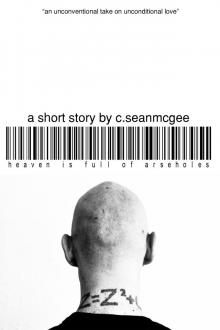 Heaven is Full of Arseholes
Heaven is Full of Arseholes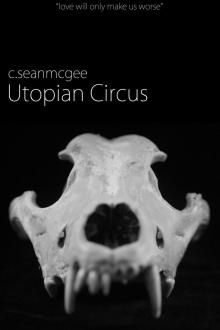 Utopian Circus
Utopian Circus![[2014] The Time Traveler's Wife Read online](http://i1.bookreadfree.com/i/03/24/2014_the_time_travelers_wife_preview.jpg) [2014] The Time Traveler's Wife
[2014] The Time Traveler's Wife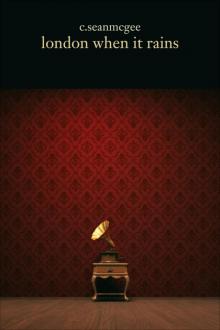 London When it Rains
London When it Rains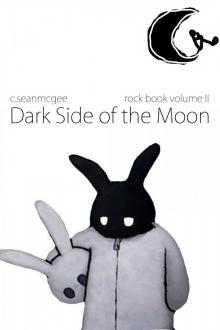 Dark Side of the Moon by C. Sean McGee
Dark Side of the Moon by C. Sean McGee![The Terror[blist] Read online](http://i1.bookreadfree.com/i2/04/06/the_terrorblist_preview.jpg) The Terror[blist]
The Terror[blist]